News & Events
Learn, unlearn and relearn to achieve progressive innovation
With the primary objective of spearheading entrepreneurship development and incubator initiatives geared towards business enterprise development, Unisa officially launched the Inhlanyelo Hub, a progressive entrepreneur incubator initiative, on 16 November 2023. The launch coincided with the 2023 Global Entrepreneur Week that runs from 13-17 November 2023, and it was dedicated to nurturing start-up businesses and equipping them with the entrepreneurial skills necessary for self-sufficiency.
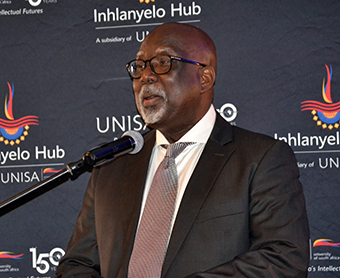
Prof Thomas Mogale
“This endeavour, sanctioned by the Unisa Council in November 2021, is not a mere response but a proactive step towards fulfilling the vision set forth by the Department of Higher Education and Training’s Entrepreneurship Development in Higher Education (EDHE) Programme,” remarked Professor Thomas Mogale, Executive Dean of the College of Economic and Management Sciences (CEMS) and the Board Chairperson of the Inhlanyelo Hub. Through this programme, Unisa was recently selected as part of the second cohort of universities to establish an Economic Activation Office. Aligning it with the EDHE Programme, Mogale explained that the Inhlanyelo Hub was established to foster entrepreneurial thinking among Unisa students and staff, address unemployment, and contribute to economic upliftment through the encouragement of entrepreneurship, ideation, and business start-ups.
Mogale also maintained that the hub aligned with Unisa’s 2030 Strategy of seeking to establish a dynamic educational environment to promote academic excellence and foster an entrepreneurial spirit. He explained that the Nguni term Inhlanyelo, meaning seed in English, signified life, growth, renewal, embodying potential, fertility, and the unbroken continuum of life. He added: “This hub is an enabler of dreams, an incubator of innovation, and a storyteller of growth.” Mogale continued: “As we embark on this transformative journey, let us sow the seeds of entrepreneurship and watch them blossom into vibrant enterprises that contribute to the economy and society, echoing the rich traditions and values that define us as Africans.”
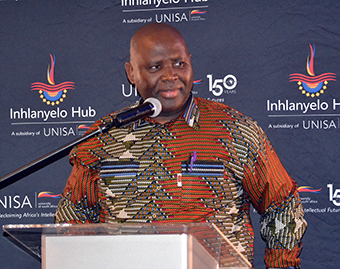
Dr Somadoda Fikeni
Innovators urged to have solutionist mindset
In his keynote address, Dr Somadoda Fikeni, Chairperson of the South African Public Service Commission, said that innovation was not a complicated thing, but it needed the right mindset and pattern of behaviour. “We live in an era of ‘vuka’ (woke), which is volatile, uncertain, complex and ambiguous,” added Fikeni. He emphasised that it was important to navigate the innovation space with gyroscopic agility and without losing balance and relevance.
For Fikeni, in the ever-changing environment, it is important for innovators to adapt to disruptions and to become positive disruptors. Fikeni reiterated: “The innovation space does not require religious thinking; therefore, it is important to learn, unlearn and relearn, as it is problematic to hold on to knowledge that is no longer relevant.”
Fikeni maintained that innovators must continuously assess their habits and possess a solutionist mindset to solve problems in society and their spaces. Speaking on rapid advances in technology, he remarked that they must be useful to humanity. Fikeni also said that values, ethical dimensions and social justice are fundamental in innovation. “Whatever good idea you have, it has diminishing returns, which then would require you to reimagine another solution to avoid being swallowed by the future,” he added.
During the proceedings, a video recording on the launch of the first cohort of the Inhlanyelo Drone Divas Programme, which is geared towards empowering women in aviation, was shown. Also showcased was Inhlanyelo Connect, which, among others, indicates that the hub contextualised and humanised artificial intelligence, and that it is committed to nurturing future minds.
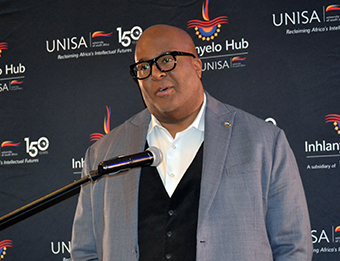
Dr Nakia Melecio
Investing in students as future innovators
Dr Nakia Melecio, Director of the Center for MedTech Excellence at the Georgia Institute of Technology in the United States of America, said that understanding why incubation was important at institutions of higher learning helped to be conscious of the essence of what innovation and science were about. He remarked that science and innovation must contribute to the country’s gross domestic product growth. “To unleash innovation in South Africa’s ecosystem,” Melecio continued, “requires cooperative efforts from government, citizens, universities, local business owners and investors, among others.”
Melecio encouraged innovators to understand their value and to network in order to enhance collaboration. For Melecio, the power of networking and relationship building elevated innovation, highlighting that the world was interconnected irrespective of geographical boarders. He asserted that from an academic perspective, successful incubation, innovation and entrepreneurship require patience, and that institutions of higher learning must invest in their students as future innovators.
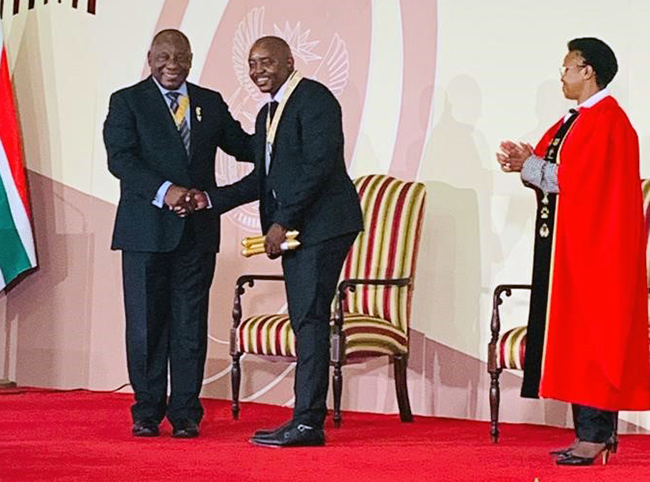
Prof Raphael Mpofu
Remaining globally relevant and building collaboration
Professor Raphael Mpofu, the interim Chief Executive Officer of the Inhlanyelo Hub, stated that the hub must be part of the global innovation ecosystem. Mpofu indicated that the hub had established some global collaboration to advance its innovation. According to Mpofu, the hub should yield to sustainable development and help to solve societal problems through creativity and innovation, which require collaborative efforts. “For community development, the hub commits to work with communities to empower them to solve their problems,” he said. Mpofu affirmed: “This launch marks the commencement of the journey to redefine our understanding of innovation and entrepreneurship at Unisa, an august university that has been in existence for 150 years.”
On behalf of Professor Puleng LenkaBula, Unisa’s Principal and Vice-Chancellor, Professor Thenjiwe Meyiwa, Unisa’s Vice-Principal of Research, Postgraduate Studies, Innovation and Commercialisation, said that the hub will contribute to redressing unemployment. She further maintained: “Collaboration and networking make such projects possible.” Meyiwa also wished the hub success in bringing positive change in and outside the university.
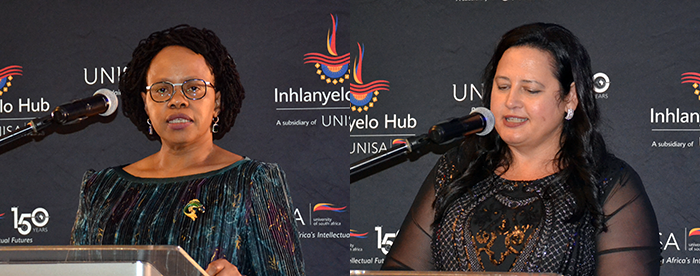
Profs Thenjiwe Meyiwa and Annemarie Davis
In closing, Professor Annemarie Davis, Project Manager of the Inhlanyelo Hub, lauded the hub as a dream that was born in 2014. She stated: “From its inception as a centre for entrepreneurial development to the incubator at Unisa, we now find ourselves in the culmination of this dream, perfectly embodied in the essence of the hub.” Davis concluded: “Together, let us continue to build bridges and turn oppositions into opportunities. Let the journey of this hub inspire us.”
#Unisa150
* By Nancy Legodi, Acting Senior Journalist, Department of Institutional Advancement
Publish date: 2023/11/17
